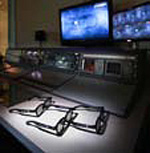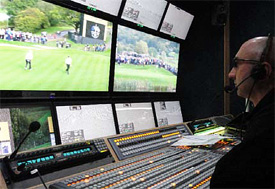What A Year It Was
One thing you can say about last year was that certainly it wasn’t bland. Kind of exciting in fact. We had the global recession, 3D, and the World Cup to name but three interesting things. Not that I’m going to discuss all of those here, no, I’m going to start with exhibitions.

Is this our future? It never ceases to amaze me how these things grow. OK, there’s a little setback now and again (the preceding couple of years for example) but now we’re firmly back to ‘highest attendance ever’ and ‘largest number of exhibitors’ territory. But why? Firstly, I know tons of peeps who often go who didn’t this year, and yet the attendances are well up, although of course the way attendance is counted seems to vary year on year. But there is no denying that the exhibitor numbers are up – again why?
Maybe it’s for the simple reason that business does get done. I personally get most of my info from the various manufacturers’ websites. Yes, it’s great to meet them in person and for some purchases great to get a demo etc. But as a freelancer I can’t afford to go every year (losing revenue as well as the costs involved) and lots of companies didn’t send so many either. So who the hell went? Beats me.
The Mighty MBA
The other thing that makes exhibitions less of an interest to me personally is the greater role of procurement departments in the buying process. These guys are brandishing their MBAs, (Masters of BS Administration) know absolutely sod all about the business and exactly what it is they are trying to buy, but gleefully screw the supplier to the floor (this is after the poor company has gone through all the ‘Tech Specs’ and RFP hoops). So when I work for large companies, there is little point in me striking up a relationship with a supplier as ‘procurement’ will scupper it, along with the accounts department who will pay them late and piss them off. So there is little chance of a ‘favour’ of some loan equipment or deep technical help unless the MBAs have negotiated an SLA or some other TLA.
And often their buying methodology costs a lot more than it saves. Here’s an example: I was on a project that needed a few editing machines, but we weren’t allowed to buy a complete package from the manufacturer. So we bought the PC from one place, the graphics card from another and the dedicated hardware and software from the usual suspect. We had to build the PC ourselves and, surprise surprise, the PC had the wrong processor and RAM, mainly because we bought from the cheapest supplier who cocked up the order – in fact mixed it up with another one. The PCs were delivered to the IT department who promptly threw away all the documentation and disks and put a corporate image on it – which we did not need of course. All in all, we saved about £500 by buying the stuff this way only to blow about two grand in engineering time sorting out the resultant mess. And the project was late because of it – post production were not pleased, but the MBAs were all slapping themselves on the back for a job well done.
“A Little Less Tape of a Different Kind”
After years of waiting for the technology to mature, ‘tapeless’ is finally around the corner. When fully implemented it will undoubtedly have cost and efficiency savings across the broadcast workflow. It’s just that getting to that point is both costly and painful. One particular company, who shall remain nameless, amazes me by reinventing the wheel for every customer. Can it possibly be that my project was the first time they had encountered an Avid or a Flexicart? I don’t think so. Do they think that we (not sure what a collective noun for tapeless implementers would be – possibly a ‘cassette’) don’t talk to one another and compare notes? And why, oh why ,does it require so many servers? There are literally hundreds of them all doing little jobs, each with their associated backup chums. But the biggest laugh for me is that the deep archives are on robots. Tape robots. So not really ‘tapeless’, more ‘a little less tape of a different kind’.

This year we saw lots of cinema, some World Cup, and the Ryder Cup in 3D. Next year we'll likely see a 3D Royal Wedding. Whilst on the subject of servers – when I buy one of these I have to ‘conf igure’ it by choosing the CPU, RAM drives, OS, etc. Fair enough. But why can I not choose whether to have a mains lead or rack slides? In the broadcast world we generally don’t use slides but pop them on shelves and we almost never need a mains lead. Yet the costs (in both money and energy) in shipping this stuff half way around the world only to be skipped at their final destination must be huge. Not very green boys.
Then there’s 3D. I had a pop at this in September’s issue, and now other doubters have joined the fray. Check out Charlie Booker’s article in the UK’s Guardian in November. But I still maintain it’s an ‘invention’ looking for an outlet. Don’t get me wrong, I’m not anti 3D – I’ve seen some jolly good 3D stuff – in the cinema… Not at home on my relatively small TV. and I’m not personally very interested in the events: 2010 saw the World Cup in 3D, 2011 will have the UK royal wedding, and 2012 will see the (yawn) Olympics. It’s great that electronic cinematography can be tweaked to do 3D cheaply, especially the electronic displays, but I still think it will bomb in the home, at least on the main TV in the house. Now on the games computer – with 5.1 sound – excellent idea. And one of those seats that wiggles your bum when the bombs go off.
The professional video industry's #1 source for news, trends and product and tech information. Sign up below.
